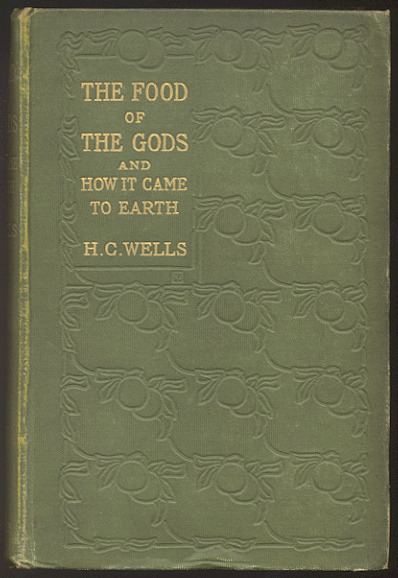One of Wells’ lesser-read (not to say obscure) works, The Food of the Gods is an enjoyable but perplexing book. The premise is simple enough: a pair of scientists invent a substance that causes life to grow much larger than normal, the explanation being that growth is naturally punctuated because of the sporadic presence of this substance, which if supplied artificially causes continual expansion. A neat and adaptable concept, and he explores its implications in several directions, yet the theme and overarching idea of the book is elusive. Is it a parable? Is it a lark? Is it a warning? And if so, to whom?
The most off-putting aspect of the book is its varying tone. It’s like a Hollywood blockbuster that tries to be both tragic and comic. This doesn’t always work out. At least with The Food of the Gods the tone changes more or less continually from jaunty and light to serious and subversive. And in the end you get the feeling that the story had become something it was never meant to be – but which Wells probably found unavoidable given its trajectory.
That is to say, the early parts of the book are light at heart, exuding a sort of youth-fiction vibe as the Food (alternately called the Food of the Gods, Herakleophorbia, and Boomfood) is first tested (producing a hilarious episode in which giant hens invade a small town – “You know that swinging stride of the emancipated athletic latter—day pullet!”), first goes out of control (giant and lethal rats and bees, which must be exterminated, and home-crushing vines and grass), and enters the mainstream (where it is clucked by the public and taken advantage of by politicians). You get the feeling this is a sort of “what if” scenario with some strange adventures and a bit of commentary on unintended consequences. The characters are deliberately ridiculous, the writing is funny and improvisational.
But later, things become serious. It follows the careers of a few children who are raised on the Food, the result being that they are not only enormous, but kept isolated and marginalized by society. It becomes an affecting study of an exaggerated generation gap, and the gap that occurs when someone chooses to ignore progress.
By the end, when it comes to bloodshed, things have gotten quite serious indeed. The politicians are cynically rendered as “votes incarnate,” the public and police as ignorant units, and the Food has come to represent Progress, and all that comes with it. Young Redwood, son of the Food’s creator and the first to be raised on it, becomes a mouthpiece for the idea of progress as an ideal:
 Will this little world of theirs be as it was before? They may fight against greatness in us who are the children of men, but can they conquer? Even if they should destroy us every one, what then? Would it save them? No! For greatness is abroad, not only in us, not only in the Food, but in the purpose of all things! It is in the nature of all things; it is part of space and time. To grow and still to grow: from the first to last that is Being – that is the law of life. What other law can there be?
Will this little world of theirs be as it was before? They may fight against greatness in us who are the children of men, but can they conquer? Even if they should destroy us every one, what then? Would it save them? No! For greatness is abroad, not only in us, not only in the Food, but in the purpose of all things! It is in the nature of all things; it is part of space and time. To grow and still to grow: from the first to last that is Being – that is the law of life. What other law can there be?
It is not as though the little and great could live together in any perfection of compromise. It is one thing or the other. What right have parents to say, My child shall have no light but the light I have had, shall grow no greater than the greatness to which I have grown?“
It is the question of Pandora’s box. Once opened, never to be closed again. And the consequence, though the book ends before this takes place, must eventually be the eradication of life as it exists on the world. It’s a hell of a way for a book to end, which started out seemingly as a mere indulgence in a creative conceit — an excuse to write, to have a plague of giant bees, to use the phrase “flappish and whangable.”
The whole thing takes place not as a unified narrative, but rather in a series of vignettes, breaking up the story by location and skipping back and forth by years. It feels to me as if Wells only realized the vastness of the story he was telling after he started, and was not able to (or not in a mood to) follow through on that potential. With The War of the Worlds, it seems he had everything in mind beforehand, as a means to knock Britain off its perch and warn of the dangers of complacency. With The Food of the Gods, he seems to have accidentally stumbled over a Great Book, and declined to write it. It is still very enjoyable, but the book simply is not itself.

